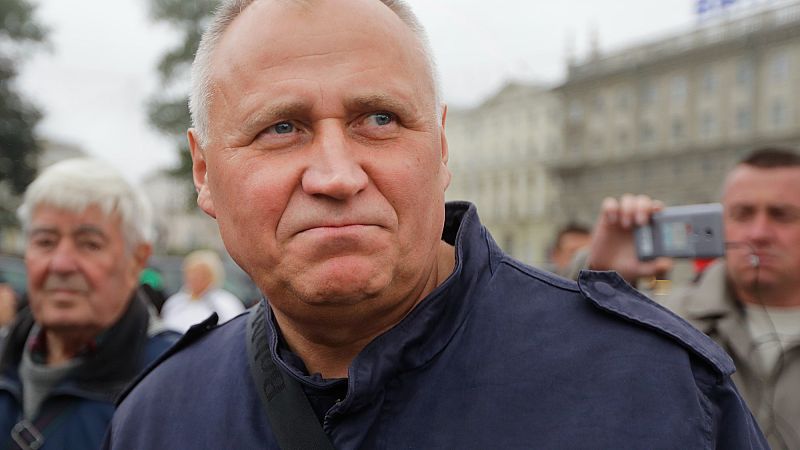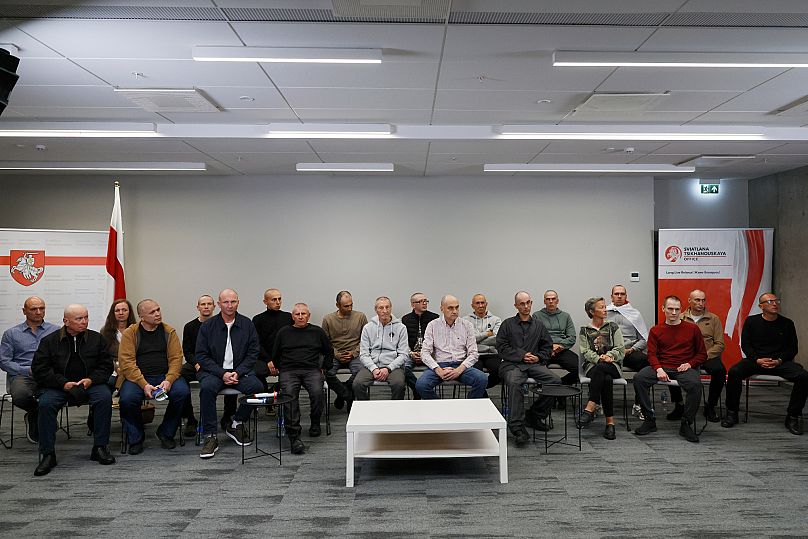Freed Belarus prisoners: Prominent opposition leader refuses forced exile

As part of a deal brokered by the United States, which lifted some sanctions on the Belarusian national airline Belavia, Minsk released 52 prisoners last Thursday. Those included 14 foreign nationals from Poland, Lithuania, Latvia, Germany, France and the United Kingdom. But Mikalai Statkevich, the most prominent opposition figure among the freed prisoners, is missing.
The released Belarusian prisoners, among which political opponents, journalists and independent trade unionists, were hosted in shelters in the Lithuanian capital upon their arrival. Many of them are now staying with relatives, Belarusian activists exiled in Lithuania told Euronews.
As the bus taking the group from Belarus to Lithuania entered the no man’s land between the two countries, the 69-year-old veteran dissident reportedly hit an emergency stop button and exited the bus, refusing to be forced into exile from his native country.
He was identified, dressed in his prison uniform, sitting in the “neutral zone” between the two State borders in a CCTV image released by the Belarusian opposition newspaper Nasha Niva, one of the rare Belarusian opposition newspapers.
A few hours later, he made his way back to Belarus accompanied by several Belarusian soldiers, though walking on his own, according to Lithuania's State Border Guard Service.
Lithuania's Ministry of Foreign Affairs also confirmed that Statkevich chose to stay in Belarus.
“I can confirm that there is one person who wants to stay. He is currently in the territory of Belarus, he is not in the territory of Lithuania,” a spokesperson for Foreign Affairs Minister Kęstutis Budrys confirmed to the ELTA news agency.
Denis Kuchynski, an adviser to Belarusian opposition leader Sviatlana Tsikhanouskaya, also confirmed to independent Russian outlet Dozhd that the man in question was indeed Statkevich.
Mikolai Stakevich’s wife Marina declined to comment, but did indicate to sources who spoke to Euronews that her husband had not returned home and there was no information as to his whereabouts.
Statkevich, former President of the Belarusian Social Democratic Party, Narodnaya Gramada, ran for Presidency in 2010 against Belarusian President Aliaksandr Lukashenka.
He was repeatedly detained and released in the years that followed, before he was charged for “organisation of mass riots” and handed a 14-year prison sentence in 2021.
Mikalai Statkevich’s constant struggle for freedom and democracy have earned him unabating popularity amongst parts of the Belarusian society. A former army lieutenant colonel, he allegedly also still has support amongst the military, where he was known as a respected officer.
"He represents a moral authority for many people in Belarus, and could play a decisive role in the future," a Belarusian activist in exile in Vilnius told Euronews.
Euronews spoke to the dissident and his wife in their home in Minsk back in 2018, only a few days before witnessing one of his many arrests. At the time, Mikalai Statkevich had already spent a total of 8 years in prison, yet was determined to keep up his political fight against the Lukashenka regime.
"This is not a free country. People have no influence on power. There still are political prisoners, and they are tortured. This country suffocates people, it's hard to breathe here. Fear reigns here all the time." he told Euronews at the time.
"If nobody talks about freedom in the country, if no one fights for it, then people forget that freedom exists. Society is disintegrating, and the country becomes an easy prey for any outside force. Now, Lukashenka is supported by Putin, and Putin is much more popular than Lukashenka in Belarus. This makes the potential annexation of Belarus very easy and attractive for Putin."
A press conference with the released prisoners was held this Friday in Vilnius by exiled Belarusian opposition leader Sviatlana Tsikhanouskaya. Among them was the Narodnaya Gramada party's former Secretary General Sergei Sparysh, who said he had briefly met with Mikolai Statkevich shortly before their release in the "KGB prison" - as it is still called in Belarus - they were held in.
He described Statkevich as being "in very good moral condition" and inspired by Belarusians, despite having spent 2 years and 7 months in solitary confinement, all while in poor health.
“There cannot be a nation in which there is no leader located on the territory of this country. Nelson Mandela could not be the leader of the (South) African people while being somewhere in exile. Therefore, Nikolai Statkevich stayed in Belarus,” said Sparysh.
Meanwhile, Sviatlana Tsikhanouskaya appealed to the US administration to clarify Statkevich’s situation. “We are happy to see people free. But let’s be honest - what happened yesterday was not real freedom, it was forced deportation,” she said at the opening of the press conference.
“We are very worried about the fate of Mikalai Statkevich, who refused to leave Belarus - which was his right - and now his whereabouts are unknown." She added that "everyone who is released must have the right to choose to stay or to leave.”
At the time of writing, many more political activists and human rights defenders are still being held in Belarusian prisons. "President Trump has set the goal: all 1,300 must be released. We will continue to work with the US administration and our allies in Europe to make sure the releases continue," concluded Tsikhanouskaya.
Today


